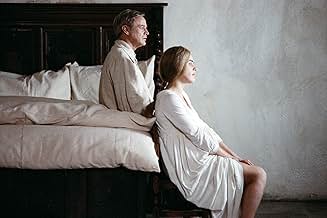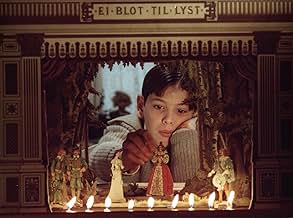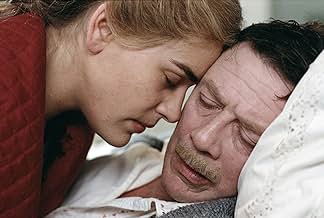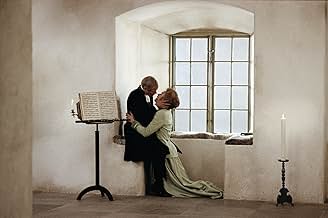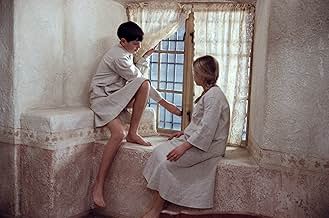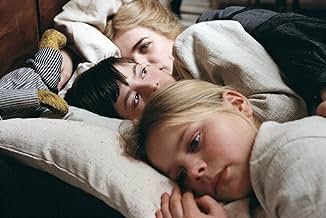AVALIAÇÃO DA IMDb
8,1/10
70 mil
SUA AVALIAÇÃO
Duas crianças suecas vivenciam as muitas comédias e tragédias de sua família, os Ekdahls.Duas crianças suecas vivenciam as muitas comédias e tragédias de sua família, os Ekdahls.Duas crianças suecas vivenciam as muitas comédias e tragédias de sua família, os Ekdahls.
- Ganhou 4 Oscars
- 25 vitórias e 13 indicações no total
Patricia Gélin
- Staty - Ekdahlska huset
- (as Patricia Gelin)
Avaliações em destaque
Perhaps the most impressive feature of this wonderful film is the humility with which its creator presents it to the world, as if it were no grander than the old-fashioned Nativity-play shown in the early scenes at the Theatre.
At the end of this experience - to term it with any mere technical tag, like 'movie', would be inadequate - Bergman's profoundly grown-up disillusionment has transformed into the pure spirituality of abnegation and acceptance. His intellectual pilgrimage, through possibly the greatest career in films, finds the director arriving back where he began, with the great simplicities of life. But there is a difference with his return, which is that his prodigality over the years has burnt the rage out of him, and finally allowed him to 'enjoy what may be enjoyed' (as one of the Ekdahls says), without further fretting over the puzzle of human existence. From all this human folly (he clearly feels) comes the only wisdom, which is - simply - to be human.
It is, indeed, a film like no other for allowing the pieces of experience to settle into their appointed places. There is a beautiful quality of selfless resignation, in this last of his works for cinema, which finally and forever excels the sadistic disciplines of The Bishop.
This perverted creature confesses, to the new wife whom he has lost, how it is impossible to 'tear off the mask' as it is 'burned into my face': He is become an authoritarian '... a rite, a law, a custom - not a man'. [Shelley] Having put the notional love of God before that of humankind, there is nowhere for his personality to be re-enacted in the bosom of any kindly recollections that will survive him. Except in that of Alexander/Bergman, where his two, each-in-their-own-way terrifying, fathers, both the White and the Black opposites of an imagination flickering with the director's haunted vision, will project forever onto his Cinematic arena of stark absolutes the inner strife where each of us is locked away, struggling to endure the turmoil of these eternally irreconcilable truths.
The White Knight and The Black Bishop: These are phantom moves in our great game with Death, and pieces that will be returned into play for as long as humanity continues. How like Chess Life is: Just a game we play, with arbitrary rules, and yet whose progress is of supreme and abiding concern to each and every one of us.
This great work is a monument to play, in all its senses, not least the play of light and the play of ideas, both equally insubstantial and yet the essence of reality, eloquent as the silence of a great, roofless Cathedral. Out of the Ruin of Faith, Bergman has wrought a Peace that passeth understanding. And it is in this ultimate by-passing of the relentless structures of intellect that Bergman finally achieves the resolution of his productive neuroses, in a truly magical film whose every phase is as inevitable as breathing, or the changeable and unimpeded weather.
As the grandmother reflects. at last, 'I don't want to put Life together anymore. I just leave it broken. Strangely, it seems better that way.'
Death, in the end, is not a calamity, but the choice of all who have truly known Life. In other words, to choose Life is to accept its Dark partner, Death. And to accept each as part of the family group, even though they seem complete misfits there.
The old lady, with Strindberg's Dream-play in her lap, knows at last that the whole history of her family is only a personal reverie. And yet how much more real it seems than her son Carl's immature and somewhat absurd, angst-ridden railings against 'cruel Fate'!
Had he only accepted his patient wife's gently sympathetic injunction to 'Never mind' the Professor would have been both wiser and happier, enduring with patient fortitude the oceanic inconsequentialities of life's real Mystery, and attending far less to the trivial pseudo-mysteries of his solipsistic men's club. All his morbid rationalising is precisely as much use in real life as the usual state of alcoholic befuddlement which is the only serious pursuit of this club.
Reason as befuddlement; The sleep of reason as deliverance. With saint-like humility, Bergman gives us back our ordinary human life, as he surrenders his exceptional life in films. But he knows that the ghost of this life will always be with us. His anguished worldliness will haunt us - as the Ghost of Hamlet's father must haunt Alexander - forever.
At the end of this experience - to term it with any mere technical tag, like 'movie', would be inadequate - Bergman's profoundly grown-up disillusionment has transformed into the pure spirituality of abnegation and acceptance. His intellectual pilgrimage, through possibly the greatest career in films, finds the director arriving back where he began, with the great simplicities of life. But there is a difference with his return, which is that his prodigality over the years has burnt the rage out of him, and finally allowed him to 'enjoy what may be enjoyed' (as one of the Ekdahls says), without further fretting over the puzzle of human existence. From all this human folly (he clearly feels) comes the only wisdom, which is - simply - to be human.
It is, indeed, a film like no other for allowing the pieces of experience to settle into their appointed places. There is a beautiful quality of selfless resignation, in this last of his works for cinema, which finally and forever excels the sadistic disciplines of The Bishop.
This perverted creature confesses, to the new wife whom he has lost, how it is impossible to 'tear off the mask' as it is 'burned into my face': He is become an authoritarian '... a rite, a law, a custom - not a man'. [Shelley] Having put the notional love of God before that of humankind, there is nowhere for his personality to be re-enacted in the bosom of any kindly recollections that will survive him. Except in that of Alexander/Bergman, where his two, each-in-their-own-way terrifying, fathers, both the White and the Black opposites of an imagination flickering with the director's haunted vision, will project forever onto his Cinematic arena of stark absolutes the inner strife where each of us is locked away, struggling to endure the turmoil of these eternally irreconcilable truths.
The White Knight and The Black Bishop: These are phantom moves in our great game with Death, and pieces that will be returned into play for as long as humanity continues. How like Chess Life is: Just a game we play, with arbitrary rules, and yet whose progress is of supreme and abiding concern to each and every one of us.
This great work is a monument to play, in all its senses, not least the play of light and the play of ideas, both equally insubstantial and yet the essence of reality, eloquent as the silence of a great, roofless Cathedral. Out of the Ruin of Faith, Bergman has wrought a Peace that passeth understanding. And it is in this ultimate by-passing of the relentless structures of intellect that Bergman finally achieves the resolution of his productive neuroses, in a truly magical film whose every phase is as inevitable as breathing, or the changeable and unimpeded weather.
As the grandmother reflects. at last, 'I don't want to put Life together anymore. I just leave it broken. Strangely, it seems better that way.'
Death, in the end, is not a calamity, but the choice of all who have truly known Life. In other words, to choose Life is to accept its Dark partner, Death. And to accept each as part of the family group, even though they seem complete misfits there.
The old lady, with Strindberg's Dream-play in her lap, knows at last that the whole history of her family is only a personal reverie. And yet how much more real it seems than her son Carl's immature and somewhat absurd, angst-ridden railings against 'cruel Fate'!
Had he only accepted his patient wife's gently sympathetic injunction to 'Never mind' the Professor would have been both wiser and happier, enduring with patient fortitude the oceanic inconsequentialities of life's real Mystery, and attending far less to the trivial pseudo-mysteries of his solipsistic men's club. All his morbid rationalising is precisely as much use in real life as the usual state of alcoholic befuddlement which is the only serious pursuit of this club.
Reason as befuddlement; The sleep of reason as deliverance. With saint-like humility, Bergman gives us back our ordinary human life, as he surrenders his exceptional life in films. But he knows that the ghost of this life will always be with us. His anguished worldliness will haunt us - as the Ghost of Hamlet's father must haunt Alexander - forever.
I am not one for putting up idols on pedestals; mostly Bergman's films leave me tepid or even cold. But Fanny och Alexander is a splendid production, beautifully made, so superb it even evokes feelings of having come from a novel. Excellent characterization throughout, all the way down the cast, lending that magic touch to the costuming of the early 1900s. Mesmerising throughout, the film is not a single minute too long. The development of the story-line is superbly handled in an absorbing and coherent manner, manifesting the great empathy between director and actors. If the cinematography is visual poetry, the script is philosophical and full of awareness or consciousness of things in life, but not at a pretentious, abstract and theoretical level, but at a real human dimension.
If you only have 10 videos in your collection, Fanny och Alexander should be one of them. My vote is a bit higher than the IMDb average.
These comments refer to the 3-hour version.
If you only have 10 videos in your collection, Fanny och Alexander should be one of them. My vote is a bit higher than the IMDb average.
These comments refer to the 3-hour version.
10ColeSear
This film could never have been made in the United States. I realize when it was made Bergman had been around for a long time and had his own clout but it still has too much of a philosophical slant to be mainstream here. This film is amazing. The first hour moves at a slow pace but it really sets up the rest of the movie well and then it really picks up. The cinematography is breathtaking and while this story makes you think a lot you don't feel ambivalent towards the characters through the rest of the first film after having been slowly introduced to all the characters you have a certain identifcation that is purely emotional and blends wonderfully with the other aspects of the film. It's truly great and should be considered one of Bergman's best works.
As Ingmar Bergman's "swan song" (which wasn't necessarily the case once After the Rehearsal and the recent Saraband were released), Fanny and Alexander was a film I saw many months ago, in its truncated, 3-hour version. I knew I had witnessed something special, something life-affirming, and above all a work that contained enough poetry, passion, and humanity for two movies. But I also felt as if there was something missing here and there. So, once the complete TV version was released, as with Scenes from a Marriage, I jumped at the opportunity to view it in its entirety. Broken up here into 5 Acts, Bergman takes another semi-autobiographical approach to his storytelling, and it's a sumptuous tale of a turn of the 20th Century family (the Ekdahls, comprising of Oscar and Emilie, the parents, Fanny and Alexander, the kids- Alexander being mostly the driving force behind the story- and also the other relatives Carl and Gustov Adolf, brothers of Oscar, Helena, Alma, Lydia, and also the housemaid Maj) who own a theater company.
What makes Fanny and Alexander work as a major achievement, if anything else for my money is that all the elements seem balanced out over the acts, with story and characters, each sharply defined. The first act unfolds with attention to the little details and the more prevalent ones in a family gathering. A key speech made by Oscar is a haunting bit of foreshadowing before they set off for the family dinner. This scene, involving more or less two dozen people, is sometimes very funny, sometimes a little unnerving, and towards the end depressing. But scenes such as these reveal how wonderful and exciting Bergman can be with his material and actors- despite it taking place in 1907, you can see these people in modern settings just as easily. There's also the scene involving Oscar with his children before they go to sleep, in which he tells them a story, which ranks as one of the more memorable, touching scenes of the film - from here, we can understand how this brings to Alexander (Bertil Guve, in a performance that is touching by being so straightforward with the innocence of child-hood) to the state he's in for much of the rest of the picture.
Then the second and third acts come around, and the tragedy unfolds as penetrating as I've seen in any film, much less from Bergman. It wouldn't spoil it to say that Oscar succumbs to an illness, and passes away. From here, Emilie (Ewa Fröling, a performance meant for Liv Ullman, which she fits just as well) tries to go on as usual, and it just doesn't feel the same. She seeks counsel from the village bishop, Edvard Vergerus (Jan Malmsjo, previously in Bergman's Scenes from a Marriage), and subsequently falls in love with him, or at least thinks she does. They get married, and the children are forced into leaving (almost) everything behind to live at his dreary, caged residence, a far cry from where they once lived, a place lush with colors and life in the rooms. Both of these assets are provided by an Oscar winning production design team, and the foundations of how these two, including as well the theater, display how period-perfect some of this can be.
The last two acts are when things get rough, which is a standard Bergman is known for. This kind of standard, if I could call it such, includes his personal connection to the Christian church, in particular with his father being a Lutheran priest. I'm not guessing on how fact based Bishop Vergerus is to Bergman's life, and I really don't want to either. One of the things I loved about the film (than some likely hated on it's original release- I know, for example, that my father was devastated after watching this film) is how the good and the bad, or what could be seen as good and bad, are paired off, and how the middle-ground is just as clear or un-clear. Emilie is a good person, wanting the best for her children and for herself, but she doesn't know how to do that without someone to bring guidance when she cannot after grieving for her dead husband (who appears sometimes to Alexander, which is another matter). Alexander, who is a child raised with all the enthusiasm to express himself as such by his uncles and particularly his theatrical father Oscar, is good but lending himself to not being too firm on what's real and what is not.
The Bishop, on the other hand, is one who, as he says at one point "has only one mask". His is a puritanical approach, who sees imagination in only one strict aspect, and has terms of love that are by his code of living and understanding of people. Veregus, along with his family that live in fear and suffering (Harriet Andersson's character, and with the character of the heavy, ill aunt), know little is anything about how the Ekdahls have lived. What ends up happening, even from the get-go of the third act, in the fourth and fifth acts Bergman reveals Bishop Veregus to be an immense antagonist, one that allows just enough sympathy in one or two spots to not throw something at the TV, but with the kind of language that only the most terrifying of movie characters possess. Bottom line, this character, whether you like the film or not, is one of Bergman's greatest creations, and is pulled off by Malmjso with icy, disturbing perfection; it's one of the most memorable of the kind in film I can think of, right up there with Nurse Ratched, HAL 9000, and Darth Vader.
But what torment and anguish the characters, as well as much of the audience, seem to endure in the fourth/fifth acts; there also comes revelatory moments of sheer beauty and enchantment. A couple of scenes involving Alexander in the puppet shop, for example, display a level of artistry that goes between Bunuel and Disney. And a particular, long soliloquy by Isak (Erland Josephsson, not under-used at all) to the children is a poem unto itself that gives me an idea that Bergman had he not gone into theater and film, would've been one of the great poets of the 20th century. As the catharsis comes, it comes with a kind of justice that works in the only way it satisfyingly could have. With the fates of the Bishop, Emilie, and Alexander and Fanny brought to a close, as with the Grandmother, the uncles and aunts, and so on, it's all very symbolic, metaphorical, and real, and it gels together.
One last note- Sven Nykvist, who one his second Oscar with Bergman for this film, creates the kinds of shots that some could only have in their dreams. When he visualizes something for Bergman with the forces of light and dark, with the subtlety and nuance, it's all the better. To put this all in another way, I could go on and on about this huge, heart-rendering work, but it all comes down to this- as an emotional, intellectual, and spiritual (surprisingly for me, who sees religion as a kind of fantasy) sort of film-viewing experience, Fanny and Alexander is one of the most profound I've ever had. Some may feel the same; some may want to forget they ever experienced it. But one thing the film does is stick with you, if only for a little while, and that's really what a film can and should do....by the way, the 5-hour version, at least in America, is only available on a high-priced special edition DVD pack from Criterion, but for the viewer who's already a fan of the film, it makes for a great holiday gift. A++
What makes Fanny and Alexander work as a major achievement, if anything else for my money is that all the elements seem balanced out over the acts, with story and characters, each sharply defined. The first act unfolds with attention to the little details and the more prevalent ones in a family gathering. A key speech made by Oscar is a haunting bit of foreshadowing before they set off for the family dinner. This scene, involving more or less two dozen people, is sometimes very funny, sometimes a little unnerving, and towards the end depressing. But scenes such as these reveal how wonderful and exciting Bergman can be with his material and actors- despite it taking place in 1907, you can see these people in modern settings just as easily. There's also the scene involving Oscar with his children before they go to sleep, in which he tells them a story, which ranks as one of the more memorable, touching scenes of the film - from here, we can understand how this brings to Alexander (Bertil Guve, in a performance that is touching by being so straightforward with the innocence of child-hood) to the state he's in for much of the rest of the picture.
Then the second and third acts come around, and the tragedy unfolds as penetrating as I've seen in any film, much less from Bergman. It wouldn't spoil it to say that Oscar succumbs to an illness, and passes away. From here, Emilie (Ewa Fröling, a performance meant for Liv Ullman, which she fits just as well) tries to go on as usual, and it just doesn't feel the same. She seeks counsel from the village bishop, Edvard Vergerus (Jan Malmsjo, previously in Bergman's Scenes from a Marriage), and subsequently falls in love with him, or at least thinks she does. They get married, and the children are forced into leaving (almost) everything behind to live at his dreary, caged residence, a far cry from where they once lived, a place lush with colors and life in the rooms. Both of these assets are provided by an Oscar winning production design team, and the foundations of how these two, including as well the theater, display how period-perfect some of this can be.
The last two acts are when things get rough, which is a standard Bergman is known for. This kind of standard, if I could call it such, includes his personal connection to the Christian church, in particular with his father being a Lutheran priest. I'm not guessing on how fact based Bishop Vergerus is to Bergman's life, and I really don't want to either. One of the things I loved about the film (than some likely hated on it's original release- I know, for example, that my father was devastated after watching this film) is how the good and the bad, or what could be seen as good and bad, are paired off, and how the middle-ground is just as clear or un-clear. Emilie is a good person, wanting the best for her children and for herself, but she doesn't know how to do that without someone to bring guidance when she cannot after grieving for her dead husband (who appears sometimes to Alexander, which is another matter). Alexander, who is a child raised with all the enthusiasm to express himself as such by his uncles and particularly his theatrical father Oscar, is good but lending himself to not being too firm on what's real and what is not.
The Bishop, on the other hand, is one who, as he says at one point "has only one mask". His is a puritanical approach, who sees imagination in only one strict aspect, and has terms of love that are by his code of living and understanding of people. Veregus, along with his family that live in fear and suffering (Harriet Andersson's character, and with the character of the heavy, ill aunt), know little is anything about how the Ekdahls have lived. What ends up happening, even from the get-go of the third act, in the fourth and fifth acts Bergman reveals Bishop Veregus to be an immense antagonist, one that allows just enough sympathy in one or two spots to not throw something at the TV, but with the kind of language that only the most terrifying of movie characters possess. Bottom line, this character, whether you like the film or not, is one of Bergman's greatest creations, and is pulled off by Malmjso with icy, disturbing perfection; it's one of the most memorable of the kind in film I can think of, right up there with Nurse Ratched, HAL 9000, and Darth Vader.
But what torment and anguish the characters, as well as much of the audience, seem to endure in the fourth/fifth acts; there also comes revelatory moments of sheer beauty and enchantment. A couple of scenes involving Alexander in the puppet shop, for example, display a level of artistry that goes between Bunuel and Disney. And a particular, long soliloquy by Isak (Erland Josephsson, not under-used at all) to the children is a poem unto itself that gives me an idea that Bergman had he not gone into theater and film, would've been one of the great poets of the 20th century. As the catharsis comes, it comes with a kind of justice that works in the only way it satisfyingly could have. With the fates of the Bishop, Emilie, and Alexander and Fanny brought to a close, as with the Grandmother, the uncles and aunts, and so on, it's all very symbolic, metaphorical, and real, and it gels together.
One last note- Sven Nykvist, who one his second Oscar with Bergman for this film, creates the kinds of shots that some could only have in their dreams. When he visualizes something for Bergman with the forces of light and dark, with the subtlety and nuance, it's all the better. To put this all in another way, I could go on and on about this huge, heart-rendering work, but it all comes down to this- as an emotional, intellectual, and spiritual (surprisingly for me, who sees religion as a kind of fantasy) sort of film-viewing experience, Fanny and Alexander is one of the most profound I've ever had. Some may feel the same; some may want to forget they ever experienced it. But one thing the film does is stick with you, if only for a little while, and that's really what a film can and should do....by the way, the 5-hour version, at least in America, is only available on a high-priced special edition DVD pack from Criterion, but for the viewer who's already a fan of the film, it makes for a great holiday gift. A++
SPOILER: Most of the ideas revealed through mystery by Bergman in Fanny och Alexander have already been addressed by others. The first time I saw this film was in 1984, on tv and with a much shorter version than the one released in England in 2002, which is the full 300-plus minute original.
That day I was scared -really scared- watching the scene where Alexander is been helped to let out his most evil thoughts by Ishmael, a completely mysterious character with supernatural insight. And then, a blackout. You can imagine: if I was truly scared this left me breathless.
Then, almost twenty years passed until I found this remarkable jewel, in its full version, perfectly digitised and audio-enhanced in dvd. I bought a dlp projector and used a previewing room to show it to my students. I didn't know what was going to happen. But that doubt was worth the waiting.
I think it's very difficult to say any other thing than breathtaking to underline what this film accomplishes. It's the reflected work of years of understanding and hard work between Bergman and Nyvqvist. One of the most powerful, beautiful, fearful and perfect films of all times. An exaggeration, like. Yes, but I think that there are no words to explain how plainly perfect this work is. The way it was written. The way it was directed. The way it was lighted. The way it was designed. The way each and every character plays his or her role. The details -not a Bergman's new- to which they paid the most dedicated attention to. The luxurious use of available light. The setting of the story. The amazing locations. Everything in this film was perfectly studied, down to the colour shifts that would take place in every shot!, forget about whole scenes!
The troubling minds of all those characters whose lives are at crossroads. The powerful and eventful lives of just one familiy. The small and big affairs that affect them. Gratitude and hate. Honour and shame. Guilt and love. Fear and joy. Selfishness and generosity. Every long scene exudes with tension, pure fun or pleasure; with increasing uneasiness and abrupt changes of demeanor. With a richness that could only be found where a very skillful eye -trained to see what most disregard as common- finds beauty and harmony. And a sound that is as exhilarating as the narrative depiction.
When the maxim of making "every frame a Rembrandt" comes to my mind, this film makes me think Bergman pushed the envelope a little further: he gives (or I'd rather say, Nyvqyst) the tratment of Van Der Meer or Bosch or Cezanne or Michelangelo to some scenes. (Think the kids playing at the nursery, the housemaidens sewing socks, the meadow and the boat, the transfixing scene of Alexander in the attic with his mother).
And a story told from the eyes of two kids worth a ton of gold. Alexander's (Bertil Guve, when he was twelve-thirteen) enormously powerful and convincing role can certainly be compared to any big-theatre-role actor.
Superb. Don't think you've seen the whole thing until you get the 5 hour full-story.
That day I was scared -really scared- watching the scene where Alexander is been helped to let out his most evil thoughts by Ishmael, a completely mysterious character with supernatural insight. And then, a blackout. You can imagine: if I was truly scared this left me breathless.
Then, almost twenty years passed until I found this remarkable jewel, in its full version, perfectly digitised and audio-enhanced in dvd. I bought a dlp projector and used a previewing room to show it to my students. I didn't know what was going to happen. But that doubt was worth the waiting.
I think it's very difficult to say any other thing than breathtaking to underline what this film accomplishes. It's the reflected work of years of understanding and hard work between Bergman and Nyvqvist. One of the most powerful, beautiful, fearful and perfect films of all times. An exaggeration, like. Yes, but I think that there are no words to explain how plainly perfect this work is. The way it was written. The way it was directed. The way it was lighted. The way it was designed. The way each and every character plays his or her role. The details -not a Bergman's new- to which they paid the most dedicated attention to. The luxurious use of available light. The setting of the story. The amazing locations. Everything in this film was perfectly studied, down to the colour shifts that would take place in every shot!, forget about whole scenes!
The troubling minds of all those characters whose lives are at crossroads. The powerful and eventful lives of just one familiy. The small and big affairs that affect them. Gratitude and hate. Honour and shame. Guilt and love. Fear and joy. Selfishness and generosity. Every long scene exudes with tension, pure fun or pleasure; with increasing uneasiness and abrupt changes of demeanor. With a richness that could only be found where a very skillful eye -trained to see what most disregard as common- finds beauty and harmony. And a sound that is as exhilarating as the narrative depiction.
When the maxim of making "every frame a Rembrandt" comes to my mind, this film makes me think Bergman pushed the envelope a little further: he gives (or I'd rather say, Nyvqyst) the tratment of Van Der Meer or Bosch or Cezanne or Michelangelo to some scenes. (Think the kids playing at the nursery, the housemaidens sewing socks, the meadow and the boat, the transfixing scene of Alexander in the attic with his mother).
And a story told from the eyes of two kids worth a ton of gold. Alexander's (Bertil Guve, when he was twelve-thirteen) enormously powerful and convincing role can certainly be compared to any big-theatre-role actor.
Superb. Don't think you've seen the whole thing until you get the 5 hour full-story.
Você sabia?
- CuriosidadesAt the time, the largest film production ever in Sweden (with 60 speaking parts and over 1200 extras) and the most expensive, with a budget of $6 million.
- Erros de gravaçãoAmong the Christmas decorations in the Ekdahl house, there is a garland of miniature flags of the Nordic countries, including the Finnish flag. The Finnish flag was in fact only designed and adopted after Finnish independence in 1917, a decade after the events of the film.
- Citações
Ekdahlska huset - Helena Ekdahl: Everything can happen. Everything is possible and probable. Time and space do not exist. On a flimsy framework of reality, the imagination spins, weaving new patterns.
- Versões alternativasTheatrical version is 188 minutes long. The TV mini-series version is 312 minutes long.
- ConexõesEdited into Fanny e Alexander (1983)
Principais escolhas
Faça login para avaliar e ver a lista de recomendações personalizadas
Detalhes
- Data de lançamento
- Países de origem
- Idiomas
- Também conhecido como
- Fanny & Alexander
- Locações de filme
- Empresas de produção
- Consulte mais créditos da empresa na IMDbPro
Bilheteria
- Orçamento
- US$ 6.000.000 (estimativa)
- Faturamento bruto nos EUA e Canadá
- US$ 6.783.304
- Faturamento bruto mundial
- US$ 6.813.882
- Tempo de duração
- 3 h 8 min(188 min)
- Mixagem de som
- Proporção
- 1.66 : 1
Contribua para esta página
Sugerir uma alteração ou adicionar conteúdo ausente


